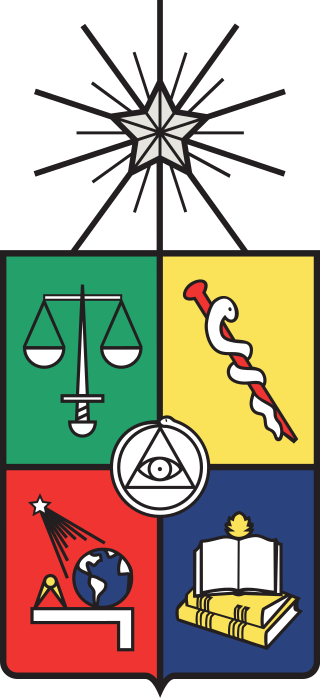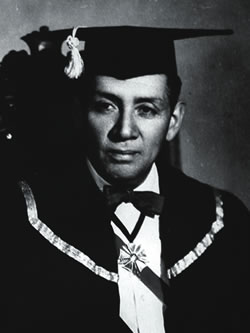
The University of Chile is a public research university in Santiago, Chile. It was founded on November 19, 1842, and inaugurated on September 17, 1843. It is the oldest in the country. It was established as the continuation of the former colonial Royal University of San Felipe (1738), and has a rich history in academic, scientific and social outreach. The university seeks to solve national and regional issues and to contribute to the development of Chile. It is recognized as one of the best universities in Latin America for its leadership and innovation in science, technology, social sciences, and arts through the functions of creation, extension, teaching, and research.
In Chile, universidades tradicionales is the group of universities founded before the 1980s. It usually includes universities derived from traditional ones. A more precise term is Universidades del Consejo de Rectores.

Austral University of Chile is a Chilean research university based primarily in Valdivia, with a satellite campus in Puerto Montt. Founded on September 7, 1954, it is one of the eight original Chilean Traditional Universities. It operates as a nonprofit self-owned corporation under private law, and receives significant state-funding.

University of Magallanes (UMAG) is a university in the southern Chilean city of Punta Arenas. It is a public state university and it is part of the Chilean Traditional Universities. The University of Magallanes was established in 1981 during the neoliberal reforms of the Chile's military regime as the successor of Universidad Técnica del Estado's Punta Arenas section. Universidad Técnica del Estado had established the Punta Arenas section in 1961. The University of Magallanes have campuses in Punta Arenas and Puerto Natales as well as a university centre in Puerto Williams. University of Magallanes publishes the humanities and social sciences journal Magallania twice a year.
Viedma is a subglacial volcano whose existence is questionable. It is supposedly located below the ice of the Southern Patagonian Ice Field, an area disputed between Argentina and Chile. The 1988 eruption deposited ash and pumice on the ice field and produced a mudflow that reached Viedma Lake. The exact position of the edifice is unclear, both owing to the ice cover and because the candidate position, the "Viedma Nunatak", does not clearly appear to be of volcanic nature.
Austral means 'southern', often in reference to the Southern Hemisphere.

Tom Dillehay is an American anthropologist who is the Rebecca Webb Wilson University Distinguished Professor of Anthropology, Religion, and Culture and Professor of Anthropology at Vanderbilt University. In addition to Vanderbilt, Dillehay has taught at the Universidad Austral de Chile and the University of Kentucky. Since 1977, Dillehay has been involved in the excavations at Monte Verde in Chile, where an early human settlement was found in 1975. Dillehay claims that the remains are about 14,800 years old according to the calibrated dates of carbon 14. The data suggest that people might have been in South America before 15,000 years ago and challenging the Clovis theory of the first human arrival in the Americas.

Teja island is an island in the city of Valdivia, Chile, surrounded by three rivers: Cau-Cau river to the north, Cruces river to the west and Valdivia river to the southeast. Prior to the mid-19th century, the island was known as isla Valenzuela after Francisco de Valenzuela, an encomendero that settled there in 1552. In the second half of the 19th century the island became known for its roof tile and brick factory, hence the name isla Teja. Initially it was outside the proper city, but with the arrival of German immigrants many of them settled there and since 1939 the island is directly connected to downtown Valdivia through the Pedro de Valdivia bridge. A large section of the island's western riverside sank below water level due to the Great Chilean earthquake of 1960.

Hugo Gunckel Lüer was a Chilean pharmacist, botanist, and university professor.
The Magallanes Basin or Austral Basin is a major sedimentary basin in southern Patagonia. The basin covers a surface of about 170,000 to 200,000 square kilometres and has a NNW-SSE oriented shape. The basin is bounded to the west by the Andes mountains and is separated from the Malvinas Basin to the east by the Río Chico-Dungeness High. The basin evolved from being an extensional back-arc basin in the Mesozoic to being a compressional foreland basin in the Cenozoic. Rocks within the basin are Jurassic in age and include the Cerro Toro Formation. Three ages of the SALMA classification are defined in the basin; the Early Miocene Santacrucian from the Santa Cruz Formation and Friasian from the Río Frías Formation and the Pleistocene Ensenadan from the La Ensenada Formation.

Eduardo Morales Miranda was one of the founders of Universidad Austral de Chile, and its first rector. He was born to Abdón Morales and Amelia Miranda, who lived in Constitución, Maule Region, Chile. Morales went to high school in Liceo Manuel Blanco Encalada in Talca, and went on later to study medicine in Universidad de Chile, where he became a physician. In 1954 he was elected President of the Directory of Members of the newly created Universidad Austral de Chile. He was elected rector of the university the same year and stayed in that position until 1961 when he renounced. He turned 100 in November 2010.
Bosque is a scientific journal published by the Forestry Faculty of the Southern University of Chile. It publishes articles on a wide range of forestry-related topics, primarily on issues that are relevant to Chile, Latin America and the Southern Hemisphere. The published articles include peer-reviewed scientific research papers, items of current interest and opinion pieces. Bosque's first issue was published in 1975 and the journal was issued yearly until 1985. From 1985 to 2003 it was issued twice a year and from 2003 on three times a year. The topics covered in Bosque are management and production of forestry resources, wood science and technology, silviculture, forest ecology, natural resources conservation, and rural development associated with forest ecosystems. The journal publishes research articles, notes and opinions, both in Spanish and English. Bosque was included in the Science Citation Index Expanded in 2009. The journal is also indexed in The Zoological Record.
Chungara Revista de Antropología Chilena is a peer-reviewed academic journal on anthropology and archaeology with particular, but not exclusive, focus on the Andean region. The journal is published by the Departamento de Antropología and the editor-in-chief is Vivien G. Standen.
Revista Austral de Ciencias Sociales is a biannual peer-reviewed academic journal specialising in social science, including fields such as history and archaeology. It was established in 1997 and is published by the Austral University of Chile. The journal is abstracted and indexed in Scopus, Redalyc, and Latindex.
The following lists events that happened during 1982 in Chile.
Atenea is a biannual peer-reviewed academic journal containing research and critical reflections on Chilean and Latin American culture including arts, literature, history, sociology, and other sciences. It is published by the University of Concepción. The journal is abstracted and indexed in Arts and Humanities Citation Index, Hispanic American Periodicals Index, SciELO, and Redalyc.

The Iberoamerican University of Science and Technology or UIBERO is a private university Chilean accredited by the National Commission of Accreditation (CNA-Chile). It finds situated in the city of Santiago of Chile.
The Jorge Millas Award was instituted in 1996 to remember the work of the distinguished intellectual Jorge Millas (1917–1982), an academic at the University of Chile and dean of the Faculty of Philosophy and Social Sciences of the Austral University of Chile.







